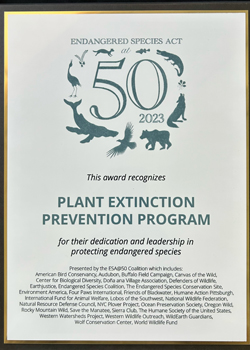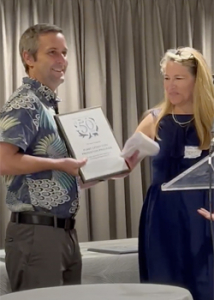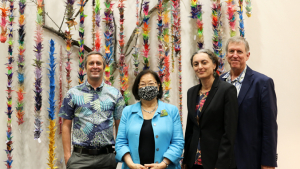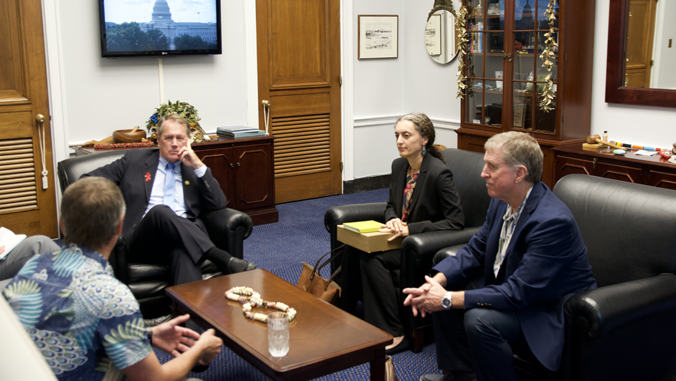
Each year, the University of Hawaiʻi at Mānoa’s Plant Extinction Prevention Program helps protect about half of the 423 threatened and endangered plant species in Hawaiʻi by focusing on efficacy, cost efficiency and innovation. The program recently garnered a national award for its contributions to protecting and supporting the Endangered Species Act.
The award was presented in September 2023 by the Endangered Species Coalition and a group of 30 other local, regional and national conservation organizations at an event in Washington, D.C. commemorating the 50th anniversary of the Endangered Species Act. Accepting the award on behalf of the Plant Extinction Prevention Program was Scott Heintzman, coordinator of the Kauaʻi Plant Extinction Prevention Program. Also in attendance was Clifford Morden, deputy director of the UH Mānoa Pacific Cooperative Studies Unit and interim director of the School of Life Sciences; and Shaya Honarvar, director of the Pacific Cooperative Studies Unit.
“The success of our program results from the hard work of countless passionate individuals and the highly collaborative efforts among the different local communities, NGO’s, and state, county and federal organizations,” Morden said.

The Plant Extinction Prevention Program focuses on emergency actions, captive propagation and reintroduction efforts for those species closest to the brink of extinction—Hawaiian plants that have 50 or fewer individuals left in the wild. More than 200 of the rarest plant species in the world receive emergency-room actions under this program. No plant has gone extinct since its inception. The Plant Extinction Prevention Program has already saved dozens of species from extinction and helped reintroduce more than 110 species into native forests.
“Although Hawaiʻi has long been regarded as the endangered species capital of the world, through our conservation actions we hope to one day be recognized as the biosecurity capital of the world,” Heintzman said.
Joining the Plant Extinction Prevention Program in receiving an award were Jane Goodall, the Nez Perce Tribe, the Yurok Tribe, Bat Conservation International, the Sea Turtle Conservancy and members of Congress. Passed with bipartisan support and signed into law in 1973, the Endangered Species Act is a landmark law that has prevented 99% of the species it protects from going extinct and has put hundreds more on the path to recovery.

During their visit to Washington, D.C., Morden, Honarvar and Heintzman met with members of Hawaiʻi’s congressional delegation, the deputy director of the U.S. Fish and Wildlife Service and the Center for Biological Diversity.
The Plant Extinction Prevention Program operates as a project of the UH Mānoa Pacific Cooperative Studies Unit and is supported by state and federal funds, grants, and donations from public and private institutions.


